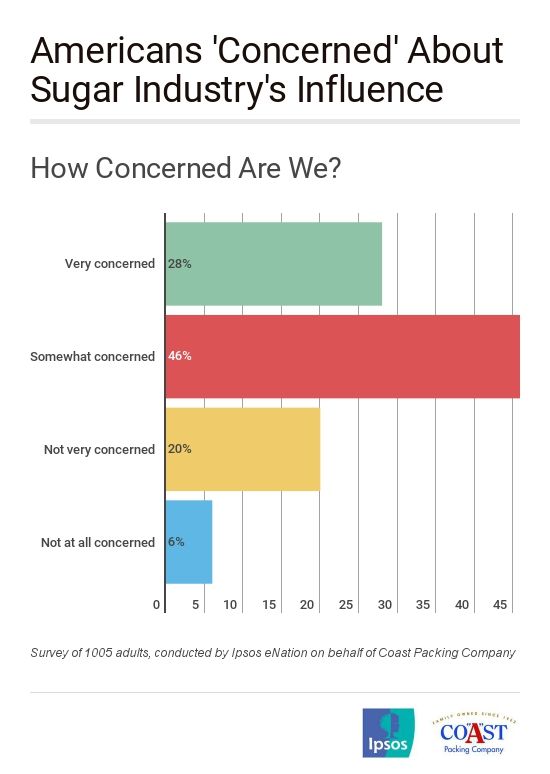Vast Majority of Americans ‘Concerned’ About Sugar Industry’s Influence in Shaping Dietary Guidelines, New Coast Packing/Ipsos Survey Reveals

Amid reports that the sugar industry manipulated science to its own ends, a substantial majority of Americans say that disclosure has left a sour taste – and some are even re-thinking their consumption of the sweet stuff.
That’s the clear conclusion of a new nationwide survey from Coast Packing Company and Ipsos Research, conducted in late January among 1,005 consumers. Citing a Sept. 12, 2016 New York Times article, “How the Sugar Industry Shifted Blame to Fat,” the survey measured the level of concern about the practice and its impact on the use of both sugar and animal fats. Coast Packing is the number one supplier of animal fat shortenings in the Western United States.
According to the Times article, “the sugar industry paid scientists in the 1960s to play down the link between sugar and heart disease and promote saturated fat as the culprit instead, newly released historical documents show. The internal sugar industry documents, recently discovered by a researcher at the University of California, San Francisco, and published … in JAMA Internal Medicine, suggest that five decades of research into the role of nutrition and heart disease, including many of today’s dietary recommendations, may have been largely shaped by the sugar industry…”
In the Coast/Ipsos survey, three-quarters of Americans (74 percent) expressed concern about the issue raised in the article, with 28 percent “very concerned” and 46 percent “somewhat concerned.” The concern is even higher (83 percent) among respondents with children under age 17 in the household. And, true to other recent research, 85 percent of millennials – those 18 to 34 – are either “concerned” or “very concerned” (39 percent, tops among age groups).
When asked whether disclosures about the sugar industry were sufficient to prompt a change in behavior – by either consuming less in the way of sugar or by boosting their consumption of animal fats — 59 percent of respondents said they plan to alter their diets in some way related to sugar/animal fats. That’s especially the case with millennials; 38 percent indicated that they will consume less sugar. Significantly, 12 percent indicated that they will consume more animal fats, roughly double that of the next age group.
The Coast/Ipsos survey comes amid growing evidence that the conventional wisdom around fat is simply wrong. “Above 40 percent carbohydrates [in the diet], we see a steep increase in coronary heart disease risk — fats are protective,” said Prof. Salim Yusuf, president of the World Heart Federation, in a recent address. “Contrary to common belief, the current recommendation to reduce saturated fat has no scientific basis.” The World Heart Federation is dedicated to leading the global fight against cardiovascular disease (CVD), including heart disease and stroke. With a focus on low- and middle-income countries, WHF is the only CVD organization in official relations with the World Health Organization (WHO).
“While the sugar industry’s past practices are both troubling and well documented, we are encouraged that consumers have taken notice and are willing to not just re-think their attitudes but, in some cases, to modify their diets,” said Eric R. Gustafson, CEO of Coast Packing. “As we have known for some time, natural animal fats matter both for taste and for general health and well-being – a fundamental fact that millennials are especially open to embracing.
“As the World Heart Federation just affirmed in no uncertain terms, the reality is that animal fats have tangible health benefits, and their artificial/manufactured substitutes are far worse than originally believed,” Gustafson said. “We who speak on behalf of healthy fats consumption can now make an even better case that people need to think critically about claims that don’t comport with their own experience.”